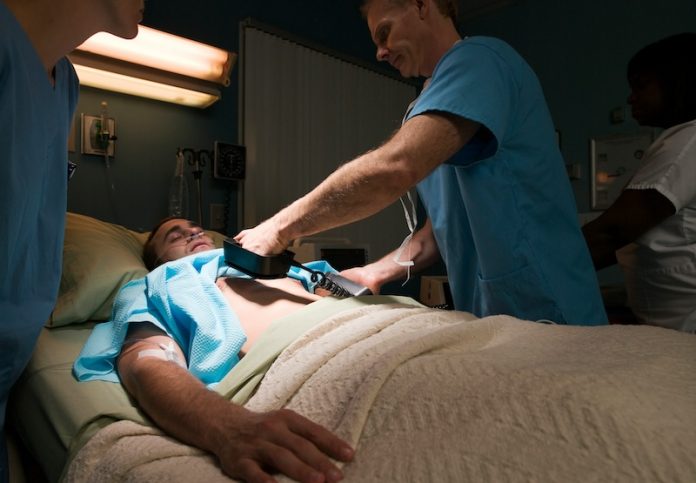
Sudden cardiac arrest (SCA) is a frightening and often deadly event where the heart suddenly stops beating.
This can happen without warning, leading to a loss of consciousness and, if not treated immediately, death.
Understanding the common causes of sudden cardiac arrest can help raise awareness and potentially save lives. Let’s explore the factors that contribute to SCA in simple terms.
One of the leading causes of sudden cardiac arrest is coronary artery disease (CAD). This condition occurs when the blood vessels that supply blood to the heart become narrowed or blocked due to a buildup of plaque. Plaque is made up of fat, cholesterol, and other substances that can accumulate over time.
When these arteries are blocked, it can reduce blood flow to the heart muscle, leading to a heart attack, which can trigger SCA. Research has shown that maintaining a healthy lifestyle, including a balanced diet, regular exercise, and avoiding smoking, can reduce the risk of CAD and, consequently, SCA.
Another significant cause of SCA is an enlarged heart, medically known as cardiomegaly. This condition can result from high blood pressure, heart valve disease, or other heart conditions. An enlarged heart has to work harder to pump blood, which can lead to electrical problems in the heart’s rhythm.
These rhythm disturbances, known as arrhythmias, can cause the heart to stop suddenly. Studies suggest that managing underlying conditions like high blood pressure and regular monitoring can help prevent cardiomegaly and reduce the risk of SCA.
Arrhythmias, or abnormal heart rhythms, are another common cause of SCA. The heart relies on electrical signals to beat properly, and when these signals become irregular, it can cause the heart to stop. Ventricular fibrillation is a type of arrhythmia that is particularly dangerous and a common cause of SCA.
In ventricular fibrillation, the heart’s lower chambers quiver instead of pumping blood effectively. This condition can be caused by various factors, including heart disease, genetic conditions, or electrolyte imbalances.
Research indicates that early detection and treatment of arrhythmias, often with medications or implanted devices like pacemakers, can help manage the risk of SCA.
Genetic factors also play a significant role in sudden cardiac arrest. Some people inherit conditions that affect the heart’s structure or electrical system, making them more susceptible to SCA.
For example, hypertrophic cardiomyopathy (HCM) is a genetic condition where the heart muscle becomes abnormally thick, making it harder for the heart to pump blood. This condition can lead to arrhythmias and SCA, especially in young athletes.
Long QT syndrome is another genetic disorder that affects the heart’s electrical activity and can cause dangerous arrhythmias. Genetic testing and family history reviews can help identify individuals at risk and guide appropriate preventive measures.
Another potential cause of SCA is heart failure, a condition where the heart cannot pump enough blood to meet the body’s needs. Heart failure can result from various heart diseases, including CAD, high blood pressure, and cardiomyopathy.
When the heart’s pumping ability is compromised, it can lead to fluid buildup and other complications, increasing the risk of SCA. Research highlights the importance of managing heart failure through medications, lifestyle changes, and regular medical follow-ups to reduce the risk of sudden cardiac arrest.
Drug abuse, particularly the use of stimulants like cocaine and methamphetamine, can also trigger SCA. These drugs can cause severe damage to the heart and blood vessels, leading to arrhythmias and heart attacks.
Studies have shown that drug-induced SCA is a significant concern, particularly among younger populations. Public health efforts to reduce drug abuse and provide support for addiction recovery are crucial in preventing these cases of SCA.
Infections and inflammations of the heart, such as myocarditis, can also cause sudden cardiac arrest. Myocarditis is an inflammation of the heart muscle, often caused by viral infections. This condition can disrupt the heart’s electrical system and lead to arrhythmias.
Although relatively rare, myocarditis can be severe and lead to SCA, especially in otherwise healthy individuals. Research underscores the importance of early detection and treatment of infections to prevent complications like myocarditis.
In summary, sudden cardiac arrest can result from various causes, including coronary artery disease, an enlarged heart, arrhythmias, genetic factors, heart failure, drug abuse, and infections.
By understanding these causes and the research behind them, we can take steps to prevent SCA and improve survival rates. Awareness, early detection, and proper management of heart conditions are essential in reducing the risk of sudden cardiac arrest and saving lives.
If you care about heart disease, please read studies that herbal supplements could harm your heart rhythm, and how eating eggs can help reduce heart disease risk.
For more information about heart health, please see recent studies that apple juice could benefit your heart health, and results showing yogurt may help lower the death risks in heart disease.
Copyright © 2024 Knowridge Science Report. All rights reserved.



